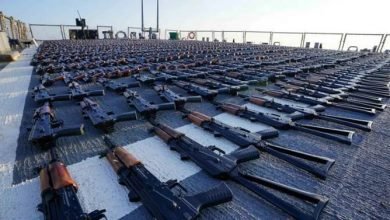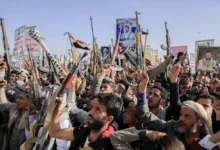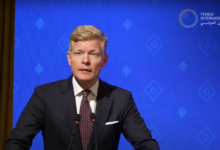Security Council Monthly Forecast of Yemen for January 2023

SMA NEWS – Special
Expected Council Action
In January 2023, the Security Council will hold its monthly briefing, followed by consultations, on Yemen. UN Special Envoy for Yemen Hans Grundberg and an OCHA representative are expected to brief. Major General Michael Beary, the head of the UN Mission to Support the Hodeidah Agreement (UNMHA), is expected to brief during the consultations.
The authorisation of the Yemen asset freeze and travel ban sanctions and the mandate of the Yemen Panel of Experts expire on 28 February and 28 March 2023, respectively. The mandate of UNMHA expires on 14 July 2023.
Key Recent Developments
Grundberg’s efforts to mediate a renewal of the truce agreement between the Yemeni government and the Houthi rebel group have continued but so far without a deal. Despite the agreement’s expiry on 2 October 2022, the parties have not resumed major military operations, and elements of the agreement—the re-opening of Sana’a airport to civilian flights and fuel imports through Hodeidah port—have continued.
On 6 December 2022, an UNMHA armoured vehicle carrying General Beary struck a land mine during a field visit in the Al Hali district of Hodeidah. No one in the vehicle or in the accompanying convoy was hurt. The convoy included the Director of the United Nations Mine Action Service (UNMAS), Ilene Cohn, who was on a week-long visit to Hodeidah, which is one of the Yemeni governorates most affected by mines and explosive remnants of war.
On 13 December 2022, Council members held closed consultations on Yemen, hearing briefings from Grundberg, OCHA’s Acting Director of Operations and Advocacy Tareq Talahma and General Beary, who apparently informed members that the UN had determined that the 6 December land mine incident was an accident. Other issues reportedly discussed were difficulties that the UN is having in receiving visas from the Houthis to send mine action experts to Hodeidah and the government’s hesitancy to approve the delivery of equipment needed to remove mines. The Houthis’ increased enforcement of “mahram”, which makes it necessary for close male relatives to accompany female Yemeni aid workers, was also raised.
On 1 December 2022, US naval forces intercepted a fishing trawler carrying more than 50 tons of ammunition rounds, fuses and propellants for rockets in the Gulf of Oman along a maritime route from Iran to Yemen, according to a US announcement. This was the second announced US interdiction within a month of arms suspected of being smuggled from Iran to the Houthis. On 8 November, the US reported that its navy had seized 70 tons of ammonium perchlorate—which is commonly used to make rocket and missile fuel as well as explosives—and 100 tons of urea fertilisers that can also be used as explosives, aboard a ship bound from Iran to Yemen.
Key Issues and Options
A key issue for the Council is how to support efforts to restore the truce and establish a formal ceasefire and political process. When the parties failed to renew the truce at the start of October 2022, Grundberg had been seeking a six-month extension that would expand the elements of the truce agreement to include the payment of civil servant salaries, among other things, but the Houthi position that their security forces also be included in the salary payments prevented an agreement. Reported talks between the Houthis and Saudi Arabia to end the war is a related initiative parallel to Grundberg’s efforts.
Houthi drone attacks in October and November 2022 against oil terminals and ports in Hadhramaut and Shabwah governorates intended to deprive the government of revenue from oil exports have become another related issue of concern. In addition to the risk of military escalation, concerns include the harm that the attacks have had on the economy, the prospect of the government’s own retaliatory economic measures, and by extension, the negative impact on the humanitarian situation.
Council members are likely to monitor Grundberg’s ongoing mediation activities. Members may reiterate calls for restraint and for the parties, especially the Houthis, to show flexibility to restore the truce. If an expanded truce agreement is brokered, the Council could adopt a presidential statement to endorse the deal. It may also encourage the parties to maintain and translate a new truce agreement into a ceasefire agreement that leads to an inclusive political process under UN auspices aimed at reaching a comprehensive settlement of the conflict.
The humanitarian situation continues to be a key issue. Beyond meeting the requirements to respond to Yemen’s enormous humanitarian need—over 66 percent of the population requires assistance—challenges entail bureaucratic impediments and movement restrictions. Land mines and explosive remnants of war have become an increasing issue of concern since the truce and post-truce period, emerging as the leading cause of civilian casualties in recent months. Members might encourage more donor support for relief efforts in Yemen, including for mine action activities.
Members are also likely to continue monitoring progress towards starting the salvage operation for the FSO Safer oil tanker, which is moored off Hodeidah port; in September 2022, the UN-facilitated plan to remove the oil from the decrepit ship finally received the donor commitments required to conduct the first phase of the operation.
Council and Wider Dynamics
Council members want the parties to restore the truce, and in their 5 October 2022 press statement, they criticised the Houthis’ “maximalist demands”, which prevented the renewal and expansion of the truce agreement in October 2022. The United Arab Emirates (UAE)—an elected Council member that has been closely involved in the conflict as a member of the Saudi Arabia-led coalition battling the Houthis—actively pushes for its views, particularly regarding the Houthis, to be reflected in Council products. Russia traditionally resists language in Council products that it perceives as too critical of the Houthis or not balanced. This year, however, Russia has been more flexible in Council negotiations on Yemen, which appears to reflect its bilateral relations with the UAE. Despite broader geopolitical tensions, the P5 ambassadors to Yemen have maintained their coordination in support of Grundberg’s efforts, while the US Special Envoy for Yemen, Timothy Lenderking, has also engaged in regional diplomacy to back UN mediation to re-establish the truce. Saudi Arabia exercises leverage on the Yemeni government, and Oman often plays an important role as an interlocutor with the Houthis.
The UK is the penholder on Yemen. Ambassador Ferit Hoxha (Albania) chairs the 2140 Yemen Sanctions Committee.








